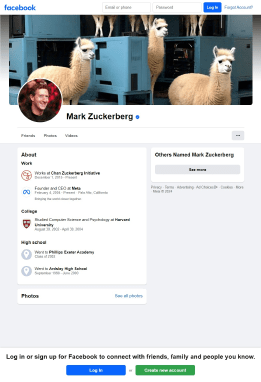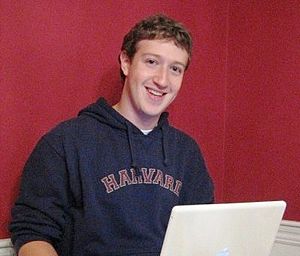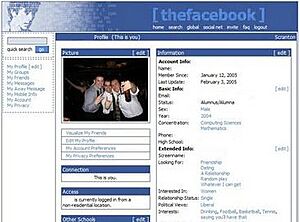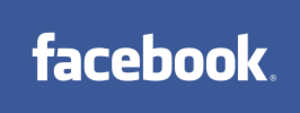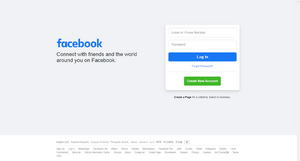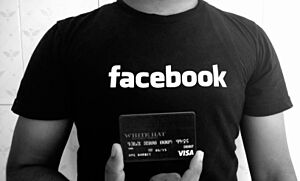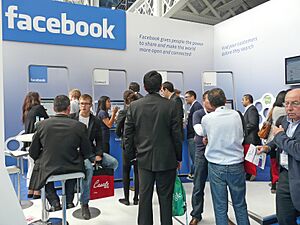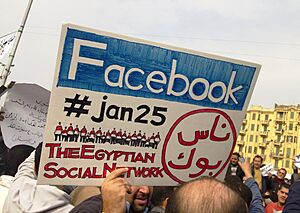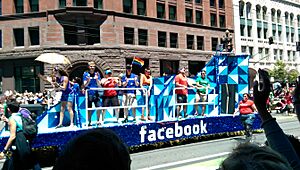Facebook facts for kids
Logo used since September 2023
|
|
|
Type of site
|
Social networking service |
|---|---|
| Available in | Multilingual Afrikaans, Albanian, Amharic, Arabic, Armenian, Assamese, Azerbaijani, Basque, Belarusian, Bengali, Bosnian, Breton, Bulgarian, Burmese, Catalan, Cebuano, Corsican, Croatian, Czech, Danish, Dutch, Dutch (België), English (UK), English (US), English (upside down), Esperanto, Estonian, Faroese, Filipino, Finnish, French (Canada), French (France), Frisian, Fula, Galician, Georgian, German, Greek, Guarani, Gujarati, Haitian Creole, Hausa, Hebrew, Hindi, Hungarian, Icelandic, Indonesian, Irish, Italian, Japanese, Japanese (Kansai), Javanese, Kannada, Kazakh, Khmer, Kinyarwanda, Korean, Kurdish (Kurmanji), Kyrgyz, Lao, Latvian, Lithuanian, Macedonian, Malagasy, Malay, Malayalam, Maltese, Marathi, Mongolian, Nepali, Norwegian (bokmal), Norwegian (nynorsk), Odia, Pashto, Persian, Polish, Portuguese (Brazil), Portuguese (Portugal), Punjabi, Romanian, Russian, Sardinian, Serbian, Shona, Silesian, Simplified Chinese (China), Sinhala, Slovak, Slovenian, Somali, Sorani Kurdish, Spanish, Spanish (Spain), Swahili, Swedish, Syriac, Tajik, Tamazight, Tamil, Tatar, Telugu, Tetun, Thai, Traditional Chinese (Hong Kong), Traditional Chinese (Taiwan), Turkish, Ukrainian, Urdu, Uzbek, Vietnamese, Welsh and Zaza |
| Founded | February 4, 2004 in Cambridge, Massachusetts |
| Area served | Worldwide, except blocking countries |
| Owner | Meta Platforms |
| Founder(s) |
|
| CEO | Mark Zuckerberg |
| Registration | Required (to do any activity) |
| Users | |
| Launched | February 4, 2004 |
| Current status | Active |
| Written in | C++, Hack (as HHVM) and PHP |
Facebook is a social media and social networking service owned by the American technology conglomerate Meta. Created in 2004 by Mark Zuckerberg with four other Harvard College students and roommates Eduardo Saverin, Andrew McCollum, Dustin Moskovitz, and Chris Hughes, its name derives from the face book directories often given to American university students. Membership was initially limited to Harvard students, gradually expanding to other North American universities. Since 2006, Facebook allows everyone to register from 13 years old, except in the case of a handful of nations, where the age limit is 14 years. As of December 2022[update], Facebook claimed almost 3 billion monthly active users. As of October 2023, Facebook ranked as the 3rd most visited website in the world, with 22.56% of its traffic coming from the United States. It was the most downloaded mobile app of the 2010s.
Facebook can be accessed from devices with Internet connectivity, such as personal computers, tablets and smartphones. After registering, users can create a profile revealing information about themselves. They can post text, photos and multimedia which are shared with any other users who have agreed to be their friend or, with different privacy settings, publicly. Users can also communicate directly with each other with Messenger, join common-interest groups, and receive notifications on the activities of their Facebook friends and the pages they follow.
The subject of numerous controversies, Facebook has often been criticized over issues such as user privacy (as with the Cambridge Analytica data scandal), political manipulation (as with the 2016 U.S. elections) and mass surveillance. Facebook has also been subject to criticism over psychological effects such as addiction and low self-esteem, and various controversies over content such as fake news, conspiracy theories, copyright infringement, and hate speech. Commentators have accused Facebook of willingly facilitating the spread of such content, as well as exaggerating its number of users to appeal to advertisers.
Contents
- History
- 2003–2006: Thefacebook, Thiel investment, and name change
- 2006–2012: Public access, Microsoft alliance, and rapid growth
- 2012–2013: IPO, lawsuits, and one billion active users
- 2013–2014: Site developments, A4AI, and 10th anniversary
- 2015–2020: Algorithm revision; fake news
- 2020–present: FTC lawsuit, corporate re-branding, shut down of facial recognition technology, ease of policy
- Website
- Impact
- See also
History
2003–2006: Thefacebook, Thiel investment, and name change

Zuckerberg built a website called "Facemash" in 2003 while attending Harvard University. The site was comparable to Hot or Not and used "photos compiled from the online face books of nine Houses, placing two next to each other at a time and asking users to choose the 'hotter' person". Facemash attracted 450 visitors and 22,000 photo-views in its first four hours. The site was sent to several campus group listservs, but was shut down a few days later by Harvard administration. Zuckerberg faced expulsion and was charged with breaching security, violating copyrights and violating individual privacy. Ultimately, the charges were dropped. Zuckerberg expanded on this project that semester by creating a social study tool. He uploaded art images, each accompanied by a comments section, to a website he shared with his classmates.
A "face book" is a student directory featuring photos and personal information. In 2003, Harvard had only a paper version along with private online directories. Zuckerberg told The Harvard Crimson, "Everyone's been talking a lot about a universal face book within Harvard. ... I think it's kind of silly that it would take the University a couple of years to get around to it. I can do it better than they can, and I can do it in a week." In January 2004, Zuckerberg coded a new website, known as "TheFacebook", inspired by a Crimson editorial about Facemash, stating, "It is clear that the technology needed to create a centralized Website is readily available ... the benefits are many." Zuckerberg met with Harvard student Eduardo Saverin, and each of them agreed to invest $1,000 ($1.55 thousand in 2022 dollars ) in the site. On February 4, 2004, Zuckerberg launched "TheFacebook", originally located at thefacebook.com.
Six days after the site launched, Harvard seniors Cameron Winklevoss, Tyler Winklevoss, and Divya Narendra accused Zuckerberg of intentionally misleading them into believing that he would help them build a social network called HarvardConnection.com. They claimed that he was instead using their ideas to build a competing product. The three complained to the Crimson and the newspaper began an investigation. They later sued Zuckerberg, settling in 2008 for 1.2 million shares (worth $300 million at Facebook's IPO, or $382 million in 2022 dollars ).
Membership was initially restricted to students of Harvard College. Within a month, more than half the undergraduates had registered. Dustin Moskovitz, Andrew McCollum, and Chris Hughes joined Zuckerberg to help manage the growth of the website. In March 2004, Facebook expanded to Columbia, Stanford and Yale. It then became available to all Ivy League colleges, Boston University, NYU, MIT, and successively most universities in the United States and Canada.
In mid-2004, Napster co-founder and entrepreneur Sean Parker—an informal advisor to Zuckerberg—became company president. In June 2004, the company moved to Palo Alto, California. Sean Parker called Reid Hoffman to fund Facebook. However, Reid Hoffman was too busy launching LinkedIn so he set Facebook up with PayPal co-founder Peter Thiel, who gave Facebook its first investment later that month. In 2005, the company dropped "the" from its name after purchasing the domain name Facebook.com for US$200,000 ($300 thousand in 2022 dollars ). The domain had belonged to AboutFace Corporation.
In May 2005, Accel Partners invested $12.7 million ($19 million in 2022 dollars ) in Facebook, and Jim Breyer added $1 million ($1.5 million in 2022 dollars ) of his own money. A high-school version of the site launched in September 2005. Eligibility expanded to include employees of several companies, including Apple Inc. and Microsoft.
2006–2012: Public access, Microsoft alliance, and rapid growth
In May 2006, Facebook hired its first intern, Julie Zhuo. After a month, Zhuo was hired as a full-time engineer. On September 26, 2006, Facebook opened to everyone at least 13 years old with a valid email address. By late 2007, Facebook had 100,000 pages on which companies promoted themselves. Organization pages began rolling out in May 2009. On October 24, 2007, Microsoft announced that it had purchased a 1.6% share of Facebook for $240 million ($339 million in 2022 dollars ), giving Facebook a total implied value of around $15 billion ($21.2 billion in 2022 dollars ). Microsoft's purchase included rights to place international advertisements.
In May 2007, at the first f8 developers conference, Facebook announced the launch of the Facebook Developer Platform, providing a framework for software developers to create applications that interact with core Facebook features. By the second annual f8 developers conference on July 23, 2008, the number of applications on the platform had grown to 33,000, and the number of registered developers had exceeded 400,000.
The website won awards such as placement into the "Top 100 Classic Websites" by PC Magazine in 2007, and winning the "People's Voice Award" from the Webby Awards in 2008. In early 2008, Facebook became EBITDA profitable, but was not cash flow positive yet.
On July 20, 2008, Facebook introduced "Facebook Beta", a significant redesign of its user interface on selected networks. The Mini-Feed and Wall were consolidated, profiles were separated into tabbed sections, and an effort was made to create a cleaner look. Facebook began migrating users to the new version in September 2008. In July 2008, Facebook sued StudiVZ, a German social network that was alleged to be visually and functionally similar to Facebook.
In October 2008, Facebook announced that its international headquarters would locate in Dublin, Ireland. A January 2009 Compete.com study ranked Facebook the most used social networking service by worldwide monthly active users. China blocked Facebook in 2009 following the Ürümqi riots.
In 2009, Yuri Milner's DST (which later split into DST Global and Mail.ru Group), alongside Uzbek Russian metals magnate Alisher Usmanov, invested $200 million in Facebook when it was valued at $10 billion. A separate stake was also acquired by Usmanov's USM Holdings on another occasion. According to the New York Times in 2013, "Mr. Usmanov and other Russian investors at one point owned nearly 10 percent of Facebook, though precise details of their ownership stakes are difficult to assess." It was later revealed in 2017 by the Paradise Papers that lending by Russian state-backed VTB Bank and Gazprom's investment vehicle partially financed these 2009 investments, although Milner was reportedly unaware at the time.
In May 2009, Zuckerberg said of the $200 million Russian investment, "This investment is purely buffer for us. It is not something we needed to get to cash flow positive." In September 2009, Facebook became cash flow positive ahead of schedule after closing a roughly $200 million gap in operating profitability.
In 2010, Facebook won the Crunchie "Best Overall Startup Or Product" award for the third year in a row.
The company announced 500 million users in July 2010. Half of the site's membership used Facebook daily, for an average of 34 minutes, while 150 million users accessed the site from mobile devices. A company representative called the milestone a "quiet revolution". In October 2010 groups were introduced. In November 2010, based on SecondMarket Inc. (an exchange for privately held companies' shares), Facebook's value was $41 billion ($55 billion in 2022 dollars ). The company had slightly surpassed eBay to become the third largest American web company after Google and Amazon.com.
On November 15, 2010, Facebook announced it had acquired the domain name fb.com from the American Farm Bureau Federation for an undisclosed amount. On January 11, 2011, the Farm Bureau disclosed $8.5 million ($11.1 million in 2022 dollars ) in "domain sales income", making the acquisition of FB.com one of the ten highest domain sales in history.
In February 2011, Facebook announced plans to move its headquarters to the former Sun Microsystems campus in Menlo Park, California. In March 2011, it was reported that Facebook was removing about 20,000 profiles daily for violations such as spam and underage use, as part of its efforts to boost cyber security. Statistics showed that Facebook reached one trillion page views in the month of June 2011, making it the most visited website tracked by DoubleClick. According to a Nielsen study, Facebook had in 2011 become the second-most accessed website in the U.S. behind Google.
2012–2013: IPO, lawsuits, and one billion active users
In March 2012, Facebook announced App Center, a store selling applications that operate via the website. The store was to be available on iPhones, Android devices, and for mobile web users.
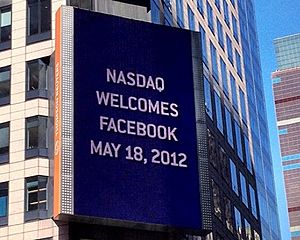
Facebook's initial public offering came on May 17, 2012, at a share price of US$38 ($48.00 in 2022 dollars ). The company was valued at $104 billion ($133 billion in 2022 dollars ), the largest valuation to that date. The IPO raised $16 billion ($20.4 billion in 2022 dollars ), the third-largest in U.S. history, after Visa Inc. in 2008 and AT&T Wireless in 2000. Based on its 2012 income of $5 billion ($6.37 billion in 2022 dollars ), Facebook joined the Fortune 500 list for the first time in May 2013, ranked 462. The shares set a first-day record for trading volume of an IPO (460 million shares). The IPO was controversial given the immediate price declines that followed, and was the subject of lawsuits, while SEC and FINRA both launched investigations.
Zuckerberg announced at the start of October 2012 that Facebook had one billion monthly active users, including 600 million mobile users, 219 billion photo uploads and 140 billion friend connections.
On October 1, 2012, Zuckerberg visited Russian Prime Minister Dmitry Medvedev in Moscow to stimulate social media innovation in Russia and to boost Facebook's position in the Russian market.
2013–2014: Site developments, A4AI, and 10th anniversary
On January 15, 2013, Facebook announced Facebook Graph Search, which provides users with a "precise answer", rather than a link to an answer by leveraging data present on its site. Facebook emphasized that the feature would be "privacy-aware", returning results only from content already shared with the user. On April 3, 2013, Facebook unveiled Facebook Home, a user-interface layer for Android devices offering greater integration with the site. HTC announced HTC First, a phone with Home pre-loaded.
On April 15, 2013, Facebook announced an alliance across 19 states with the National Association of Attorneys General, to provide teenagers and parents with information on tools to manage social networking profiles. On April 19 Facebook modified its logo to remove the faint blue line at the bottom of the "F" icon. The letter F moved closer to the edge of the box.
Following a campaign by 100 advocacy groups, Facebook agreed to update its policy on hate speech. It took action on May 29.
On June 12, Facebook announced that it was introducing clickable hashtags to help users follow trending discussions, or search what others are talking about on a topic. San Mateo County, California, became the top wage-earning county in the country after the fourth quarter of 2012 because of Facebook. The Bureau of Labor Statistics reported that the average salary was 107% higher than the previous year, at $168,000 a year ($214 thousand in 2022 dollars ), more than 50% higher than the next-highest county, New York County (better known as Manhattan), at roughly $110,000 a year ($140 thousand in 2022 dollars ).
Facebook joined Alliance for Affordable Internet (A4AI) in October, as it launched. The A4AI is a coalition of public and private organizations that includes Google, Intel and Microsoft. Led by Sir Tim Berners-Lee, the A4AI seeks to make Internet access more affordable to ease access in the developing world.
The company celebrated its 10th anniversary during the week of February 3, 2014. In January 2014, over one billion users connected via a mobile device. As of June, mobile accounted for 62% of advertising revenue, an increase of 21% from the previous year. By September Facebook's market capitalization had exceeded $200 billion ($247 billion in 2022 dollars ).
Zuckerberg participated in a Q&A session at Tsinghua University in Beijing, China, on October 23, where he attempted to converse in Mandarin. Zuckerberg hosted visiting Chinese politician Lu Wei, known as the "Internet czar" for his influence in China's online policy, on December 8.
2015–2020: Algorithm revision; fake news
As of 2015[update], Facebook's algorithm was revised in an attempt to filter out false or misleading content, such as fake news stories and hoaxes. It relied on users who flag a story accordingly. Facebook maintained that satirical content should not be intercepted. The algorithm was accused of maintaining a "filter bubble", where material the user disagrees with and posts with few likes would be deprioritized. In November, Facebook extended paternity leave from 4 weeks to 4 months.
On April 12, 2016, Zuckerberg outlined his 10-year vision, which rested on three main pillars: artificial intelligence, increased global connectivity, and virtual and augmented reality. In July, a US$1 billion suit was filed against the company alleging that it permitted Hamas to use it to perform assaults that cost the lives of four people. Facebook released its blueprints of Surround 360 camera on GitHub under an open-source license. In September, it won an Emmy for its animated short "Henry". In October, Facebook announced a fee-based communications tool called Workplace that aims to "connect everyone" at work. Users can create profiles, see updates from co-workers on their news feed, stream live videos and participate in secure group chats.
Following the 2016 U.S. presidential election, Facebook announced that it would combat fake news by using fact checkers from sites like FactCheck.org and Associated Press (AP), making reporting hoaxes easier through crowdsourcing, and disrupting financial incentives for abusers.
On January 17, 2017, Facebook COO Sheryl Sandberg planned to open Station F, a startup incubator campus in Paris, France. On a six-month cycle, Facebook committed to work with ten to 15 data-driven startups there. On April 18, Facebook announced the beta launch of Facebook Spaces at its annual F8 developer conference. Facebook Spaces is a virtual reality version of Facebook for Oculus VR goggles. In a virtual and shared space, users can access a curated selection of 360-degree photos and videos using their avatar, with the support of the controller. Users can access their own photos and videos, along with media shared on their newsfeed. In September, Facebook announced it would spend up to US$1 billion on original shows for its Facebook Watch platform. On October 16, it acquired the anonymous compliment app tbh, announcing its intention to leave the app independent.
In October 2017, Facebook expanded its work with Definers Public Affairs, a PR firm that had originally been hired to monitor press coverage of the company to address concerns primarily regarding Russian meddling, then mishandling of user data by Cambridge Analytica, hate speech on Facebook, and calls for regulation. Company spokesman Tim Miller stated that a goal for tech firms should be to "have positive content pushed out about your company and negative content that's being pushed out about your competitor". Definers claimed that George Soros was the force behind what appeared to be a broad anti-Facebook movement, and created other negative media, along with America Rising, that was picked up by larger media organisations like Breitbart News. Facebook cut ties with the agency in late 2018, following public outcry over their association. Posts originating from the Facebook page of Breitbart News, a media organization previously affiliated with Cambridge Analytica, were among the most widely shared political content on Facebook.
In May 2018 at F8, the company announced it would offer its own dating service. Shares in competitor Match Group fell by 22%. Facebook Dating includes privacy features and friends are unable to view their friends' dating profile. In July, Facebook was charged £500,000 by UK watchdogs for failing to respond to data erasure requests. On July 18, Facebook established a subsidiary named Lianshu Science & Technology in Hangzhou City, China, with $30 million ($35 million in 2022 dollars ) of capital. All its shares are held by Facebook Hong. Approval of the registration of the subsidiary was then withdrawn, due to a disagreement between officials in Zhejiang province and the Cyberspace Administration of China. On July 26, Facebook became the first company to lose over $100 billion ($117 billion in 2022 dollars ) worth of market capitalization in one day, dropping from nearly $630 billion to $510 billion after disappointing sales reports. On July 31, Facebook said that the company had deleted 17 accounts related to the 2018 U.S. midterm elections. On September 19, Facebook announced that, for news distribution outside the United States, it would work with U.S. funded democracy promotion organizations, International Republican Institute and the National Democratic Institute, which are loosely affiliated with the Republican and Democratic parties. Through the Digital Forensic Research Lab Facebook partners with the Atlantic Council, a NATO-affiliated think tank. In November, Facebook launched smart displays branded Portal and Portal Plus (Portal+). They support Amazon's Alexa (intelligent personal assistant service). The devices include video chat function with Facebook Messenger.
In August 2018, a lawsuit was filed in Oakland, California claiming that Facebook created fake accounts in order to inflate its user data and appeal to advertisers in the process.

In January 2019, the 10-year challenge was started asking users to post a photograph of themselves from 10 years ago (2009) and a more recent photo.
Criticized for its role in vaccine hesitancy, Facebook announced in March 2019 that it would provide users with "authoritative information" on the topic of vaccines. A study published in the journal Vaccine of advertisements posted in the three months prior to that found that 54% of the anti-vaccine advertisements on Facebook were placed by just two organisations funded by well-known anti-vaccination activists. The Children's Health Defense / World Mercury Project chaired by Robert F. Kennedy Jr. and Stop Mandatory Vaccination, run by campaigner Larry Cook, posted 54% of the advertisements. The ads often linked to commercial products, such as natural remedies and books.
On March 14, the Huffington Post reported that Facebook's PR agency had paid someone to tweak Facebook COO Sheryl Sandberg's Wikipedia page, as well as adding a page for the global head of PR, Caryn Marooney.
NTJ's member Moulavi Zahran Hashim, a radical Islamist imam believed to be the mastermind behind the 2019 Sri Lanka Easter bombings, preached on a pro-ISIL Facebook account, known as "Al-Ghuraba" media.
On May 2, 2019, at F8, the company announced its new vision with the tagline "the future is private". A redesign of the website and mobile app was introduced, dubbed as "FB5". The event also featured plans for improving groups, a dating platform, end-to-end encryption on its platforms, and allowing users on Messenger to communicate directly with WhatsApp and Instagram users.
On July 31, 2019, Facebook announced a partnership with University of California, San Francisco to build a non-invasive, wearable device that lets people type by simply imagining themselves talking.
On August 13, 2019, it was revealed that Facebook had enlisted hundreds of contractors to create and obtain transcripts of the audio messages of users. This was especially common of Facebook Messenger, where the contractors frequently listened to and transcribed voice messages of users. After this was first reported on by Bloomberg News, Facebook released a statement confirming the report to be true, but also stated that the monitoring program was now suspended.
On September 5, 2019, Facebook launched Facebook Dating in the United States. This new application allows users to integrate their Instagram posts in their dating profile.
Facebook News, which features selected stories from news organizations, was launched on October 25. Facebook's decision to include far-right website Breitbart News as a "trusted source" was negatively received.
On November 17, 2019, the banking data for 29,000 Facebook employees was stolen from a payroll worker's car. The data was stored on unencrypted hard drives and included bank account numbers, employee names, the last four digits of their social security numbers, salaries, bonuses, and equity details. The company did not realize the hard drives were missing until November 20. Facebook confirmed that the drives contained employee information on November 29. Employees were not notified of the break-in until December 13, 2019.
On March 10, 2020, Facebook appointed two new directors Tracey Travis and Nancy Killefer to their board of members.
In June 2020, several major companies including Adidas, Aviva, Coca-Cola, Ford, HP, InterContinental Hotels Group, Mars, Starbucks, Target, and Unilever, announced they would pause adverts on Facebook for July in support of the Stop Hate For Profit campaign which claimed the company was not doing enough to remove hateful content. The BBC noted that this was unlikely to affect the company as most of Facebook's advertising revenue comes from small- to medium-sized businesses.
On August 14, 2020, Facebook started integrating the direct messaging service of Instagram with its own Messenger for both iOS and Android devices. After the update, an update screen is said to pop up on Instagram's mobile app with the following message, "There's a New Way to Message on Instagram" with a list of additional features. As part of the update, the regular DM icon on the top right corner of Instagram will be replaced by the Facebook Messenger logo.
On September 15, 2020, Facebook launched a climate science information centre to promote authoritative voices on climate change and provide access of "factual and up-to-date" information on climate science. It featured facts, figures and data from organizations, including the Intergovernmental Panel on Climate Change (IPCC), Met Office, UN Environment Programme (UNEP), National Oceanic and Atmospheric Administration (NOAA) and World Meteorological Organization (WMO), with relevant news posts.
After the 2020 U.S. presidential election, Facebook temporarily increased the weight of ecosystem quality in its news feed algorithm.
2020–present: FTC lawsuit, corporate re-branding, shut down of facial recognition technology, ease of policy
Facebook was sued by the Federal Trade Commission as well as a coalition of several states for illegal monopolization and antitrust. The FTC and states sought the courts to force Facebook to sell its subsidiaries WhatsApp and Instagram. The suits were dismissed by a federal judge on June 28, 2021, who stated that there was not enough evidence brought in the suit to determine Facebook to be a monopoly at this point, though allowed the FTC to amend its case to include additional evidence. In its amended filings in August 2021, the FTC asserted that Facebook had been a monopoly in the area of personal social networks since 2011, distinguishing Facebook's activities from social media services like TikTok that broadcast content without necessarily limiting that message to intended recipients.
In response to the proposed bill in the Australian Parliament for a News Media Bargaining Code, on February 17, 2021, Facebook blocked Australian users from sharing or viewing news content on its platform, as well as pages of some government, community, union, charity, political, and emergency services. The Australian government strongly criticised the move, saying it demonstrated the "immense market power of these digital social giants".
On February 22, Facebook said it reached an agreement with the Australian government that would see news returning to Australian users in the coming days. As part of this agreement, Facebook and Google can avoid the News Media Bargaining Code adopted on February 25 if they "reach a commercial bargain with a news business outside the Code".
Facebook has been accused of removing and shadow banning content that spoke either in favor of protesting Indian farmers or against Narendra Modi's government. India-based employees of Facebook are at risk of arrest.
On February 27, 2021, Facebook announced Facebook BARS app for rappers.
On June 29, 2021, Facebook announced Bulletin, a platform for independent writers. Unlike competitors such as Substack, Facebook would not take a cut of subscription fees of writers using that platform upon its launch, like Malcolm Gladwell and Mitch Albom. According to The Washington Post technology writer Will Oremus, the move was criticized by those who viewed it as an tactic intended by Facebook to force those competitors out of business.
In October 2021, owner Facebook, Inc. changed its company name to Meta Platforms, Inc., or simply "Meta", as it shifts its focus to building the "metaverse". This change does not affect the name of the Facebook social networking service itself, instead being similar to the creation of Alphabet as Google's parent company in 2015.
In November 2021, Facebook stated it would stop targeting ads based on data related to health, race, ethnicity, political beliefs, religion and orientation. The change will occur in January and will affect all apps owned by Meta Platforms.
In February 2022, Facebook's daily active users dropped for the first time in its 18-year history. According to Facebook's parent Meta, DAUs dropped to 1.929 billion in the three months ending in December, down from 1.930 billion the previous quarter. Furthermore, the company warned that revenue growth would slow due to competition from TikTok and YouTube, as well as advertisers cutting back on spending.
On March 10, 2022, Facebook announced that it will temporarily ease rules to allow violent speech against 'Russian invaders'. Russia then banned all Meta services, including Instagram.
In September 2022, Jonathan Vanian, a Technology Reporter for CNBC, wrote a piece on CNBC.com about the recent struggles Facebook was experiencing, writing "Users are jumping ship and advertisers are reducing their spending, leaving Meta poised to report its second straight drop in quarterly revenue." He also cited poor leadership decisions devoting resources to the metaverse, writing "CEO Mark Zuckerberg spends much of his time proselytizing the metaverse, which may be the company's future but accounts for virtually none of its near-term revenue and is costing billions of dollars a year to build." He also detailed accounts from analysts predicting a "death spiral" for Facebook stock as users leave, ad impressions increase, and the company chases revenue.
October 4, 2021, global service outage
On October 4, 2021, Facebook had its worst outage since 2008. The outage was global in scope, and took down all Facebook properties, including Instagram and WhatsApp, from approximately 15:39 UTC to 22:05 UTC, and affected roughly three billion users. Security experts identified the problem as a BGP withdrawal of all of the IP routes to their Domain Name (DNS) servers which were all self-hosted at the time. The outage also affected all internal communications systems used by Facebook employees, which disrupted restoration efforts.
The outage cut off Facebook's internal communications, preventing employees from sending or receiving external emails, accessing the corporate directory, and authenticating to some Google Docs and Zoom services. The outage had a major impact on people in the developing world, who depend on Facebook's "Free Basics" program, affecting communication, business and humanitarian work.
Facebook's chief technology officer, Mike Schroepfer, wrote an apology after the downtime had extended to several hours, saying, "Teams are working as fast as possible to debug and restore as fast as possible."
Shutdown of facial recognition
On November 2, 2021, Facebook announced it would shut down its facial recognition technology and delete the data on over a billion users. Meta later announced plans to implement the technology as well as other biometric systems in its future products, such as the metaverse.
The shutdown of the technology will reportedly also stop Facebook's automated alt text system, used to transcribe media on the platform for visually impaired users.
In February 2023, Meta CEO Mark Zuckerberg announced that Meta would start selling blue "verified" badges on Instagram and Facebook.
Website
Technical aspects
The site's primary color is blue as Zuckerberg is red–green colorblind, a realization that occurred after a test taken around 2007. Facebook was initially built using PHP, a popular scripting language designed for web development. PHP was used to create dynamic content and manage data on the server side of the Facebook application. Zuckerberg and co-founders chose PHP for its simplicity and ease of use, which allowed them to quickly develop and deploy the initial version of Facebook. As Facebook grew in user base and functionality, the company encountered scalability and performance challenges with PHP. In response, Facebook engineers developed tools and technologies to optimize PHP performance. One of the most significant was the creation of the HipHop Virtual Machine (HHVM). This significantly improved the performance and efficiency of PHP code execution on Facebook's servers.
2012 architecture
Facebook is developed as one monolithic application. According to an interview in 2012 with Facebook build engineer Chuck Rossi, Facebook compiles into a 1.5 GB binary blob which is then distributed to the servers using a custom BitTorrent-based release system. Rossi stated that it takes about 15 minutes to build and 15 minutes to release to the servers. The build and release process has zero downtime. Changes to Facebook are rolled out daily.
Facebook used a combination platform based on HBase to store data across distributed machines. Using a tailing architecture, events are stored in log files, and the logs are tailed. The system rolls these events up and writes them to storage. The user interface then pulls the data out and displays it to users. Facebook handles requests as AJAX behavior. These requests are written to a log file using Scribe (developed by Facebook).
Data is read from these log files using Ptail, an internally built tool to aggregate data from multiple Scribe stores. It tails the log files and pulls data out. Ptail data are separated into three streams and sent to clusters in different data centers (Plugin impression, News feed impressions, Actions (plugin + news feed)). Puma is used to manage periods of high data flow (Input/Output or IO). Data is processed in batches to lessen the number of times needed to read and write under high demand periods. (A hot article generates many impressions and news feed impressions that cause huge data skews.) Batches are taken every 1.5 seconds, limited by memory used when creating a hash table.
Data is then output in PHP format. The backend is written in Java. Thrift is used as the messaging format so PHP programs can query Java services. Caching solutions display pages more quickly. The data is then sent to MapReduce servers where it is queried via Hive. This serves as a backup as the data can be recovered from Hive.
Content delivery network (CDN)
Facebook uses its own content delivery network or "edge network" under the domain fbcdn.net for serving static data. Until the mid-2010s, Facebook also relied on Akamai for CDN services.
Hack programming language
On March 20, 2014, Facebook announced a new open-source programming language called Hack. Before public release, a large portion of Facebook was already running and "battle tested" using the new language.
User profile/personal timeline
Each registered user on Facebook has a personal profile that shows their posts and content. The format of individual user pages was revamped in September 2011 and became known as "Timeline", a chronological feed of a user's stories, including status updates, photos, interactions with apps and events. The layout let users add a "cover photo". Users were given more privacy settings. In 2007, Facebook launched Facebook Pages for brands and celebrities to interact with their fanbases. 100,000 Pages launched in November. In June 2009, Facebook introduced a "Usernames" feature, allowing users to choose a unique nickname used in the URL for their personal profile, for easier sharing.
In February 2014, Facebook expanded the gender setting, adding a custom input field that allows users to choose from a wide range of gender identities. Users can also set which set of gender-specific pronoun should be used in reference to them throughout the site. In May 2014, Facebook introduced a feature to allow users to ask for information not disclosed by other users on their profiles. If a user does not provide key information, such as location, hometown, or relationship status, other users can use a new "ask" button to send a message asking about that item to the user in a single click.
News Feed
News Feed appears on every user's homepage and highlights information including profile changes, upcoming events and friends' birthdays. This enabled spammers and other users to manipulate these features by creating illegitimate events or posting fake birthdays to attract attention to their profile or cause. Initially, the News Feed caused dissatisfaction among Facebook users; some complained it was too cluttered and full of undesired information, others were concerned that it made it too easy for others to track individual activities (such as relationship status changes, events, and conversations with other users). Zuckerberg apologized for the site's failure to include appropriate privacy features. Users then gained control over what types of information are shared automatically with friends. Users are now able to prevent user-set categories of friends from seeing updates about certain types of activities, including profile changes, Wall posts and newly added friends.
On February 23, 2010, Facebook was granted a patent on certain aspects of its News Feed. The patent covers News Feeds in which links are provided so that one user can participate in the activity of another user. The sorting and display of stories in a user's News Feed is governed by the EdgeRank algorithm.
The Photos application allows users to upload albums and photos. Each album can contain 200 photos. Privacy settings apply to individual albums. Users can "tag", or label, friends in a photo. The friend receives a notification about the tag with a link to the photo. This photo tagging feature was developed by Aaron Sittig, now a Design Strategy Lead at Facebook, and former Facebook engineer Scott Marlette back in 2006 and was only granted a patent in 2011.
On June 7, 2012, Facebook launched its App Center to help users find games and other applications.
On May 13, 2015, Facebook in association with major news portals launched "Instant Articles" to provide news on the Facebook news feed without leaving the site.
In January 2017, Facebook launched Facebook Stories for iOS and Android in Ireland. The feature, following the format of Snapchat and Instagram stories, allows users to upload photos and videos that appear above friends' and followers' News Feeds and disappear after 24 hours.
On October 11, 2017, Facebook introduced the 3D Posts feature to allow for uploading interactive 3D assets. On January 11, 2018, Facebook announced that it would change News Feed to prioritize friends/family content and de-emphasize content from media companies.
In February 2020, Facebook announced it would spend $1 billion ($1.13 billion in 2022 dollars ) to license news material from publishers for the next three years; a pledge coming as the company falls under scrutiny from governments across the globe over not paying for news content appearing on the platform. The pledge would be in addition to the $600 million ($678 million in 2022 dollars ) paid since 2018 through deals with news companies such as The Guardian and Financial Times.
In March and April 2021, in response to Apple announcing changes to its iOS device's Identifier for Advertisers policy, which included requiring app developers to directly request to users the ability to track on an opt-in basis, Facebook purchased full-page newspaper advertisements attempting to convince users to allow tracking, highlighting the effects targeted ads have on small businesses. Facebook's efforts were ultimately unsuccessful, as Apple released iOS 14.5 in late April 2021, containing the feature for users in what has been deemed "App Tracking Transparency". Moreover, statistics from Verizon Communications subsidiary Flurry Analytics show 96% of all iOS users in the United States are not permitting tracking at all, and only 12% of worldwide iOS users are allowing tracking, which some news outlets deem "Facebook's nightmare", among similar terms. Despite the news, Facebook has stated that the new policy and software update would be "manageable".
Like button

The "like" button, stylized as a "thumbs up" icon, was first enabled on February 9, 2009, and enables users to easily interact with status updates, comments, photos and videos, links shared by friends, and advertisements. Once clicked by a user, the designated content is more likely to appear in friends' News Feeds. The button displays the number of other users who have liked the content. The like button was extended to comments in June 2010. In February 2016, Facebook expanded Like into "Reactions", choosing among five pre-defined emotions, including "Love", "Haha", "Wow", "Sad", or "Angry". In late April 2020, during the COVID-19 pandemic, a new "Care" reaction was added.
Instant messaging
Facebook Messenger is an instant messaging service and software application. It began as Facebook Chat in 2008, was revamped in 2010 and eventually became a standalone mobile app in August 2011, while remaining part of the user page on browsers.
Complementing regular conversations, Messenger lets users make one-to-one and group voice and video calls. Its Android app has integrated support for SMS and "Chat Heads", which are round profile photo icons appearing on-screen regardless of what app is open, while both apps support multiple accounts, conversations with optional end-to-end encryption and "Instant Games". Some features, including sending money and requesting transportation, are limited to the United States. In 2017, Facebook added "Messenger Day", a feature that lets users share photos and videos in a story-format with all their friends with the content disappearing after 24 hours; Reactions, which lets users tap and hold a message to add a reaction through an emoji; and Mentions, which lets users in group conversations type @ to give a particular user a notification.
In April 2020, Facebook began rolling out a new feature called Messenger Rooms, a video chat feature that allows users to chat with up to 50 people at a time. In July 2020, Facebook added a new feature in Messenger that lets iOS users to use Face ID or Touch ID to lock their chats. The feature is called App Lock and is a part of several changes in Messenger regarding privacy and security. On October 13, 2020, the Messenger application introduced cross-app messaging with Instagram, which was launched in September 2021. In addition to the integrated messaging, the application announced the introduction of a new logo, which will be an amalgamation of the Messenger and Instagram logo.
Businesses and users can interact through Messenger with features such as tracking purchases and receiving notifications, and interacting with customer service representatives. Third-party developers can integrate apps into Messenger, letting users enter an app while inside Messenger and optionally share details from the app into a chat. Developers can build chatbots into Messenger, for uses such as news publishers building bots to distribute news. The M virtual assistant (U.S.) scans chats for keywords and suggests relevant actions, such as its payments system for users mentioning money. Group chatbots appear in Messenger as "Chat Extensions". A "Discovery" tab allows finding bots, and enabling special, branded QR codes that, when scanned, take the user to a specific bot.
Privacy policy
Facebook's data policy outlines its policies for collecting, storing, and sharing user's data. Facebook enables users to control access to individual posts and their profile through privacy settings. The user's name and profile picture (if applicable) are public.
Facebook's revenue depends on targeted advertising, which involves analyzing user data to decide which ads to show each user. Facebook buys data from third parties, gathered from both online and offline sources, to supplement its own data on users. Facebook maintains that it does not share data used for targeted advertising with the advertisers themselves. The company states:
"We provide advertisers with reports about the kinds of people seeing their ads and how their ads are performing, but we don't share information that personally identifies you (information such as your name or email address that by itself can be used to contact you or identifies who you are) unless you give us permission. For example, we provide general demographic and interest information to advertisers (for example, that an ad was seen by a woman between the ages of 25 and 34 who lives in Madrid and likes software engineering) to help them better understand their audience. We also confirm which Facebook ads led you to make a purchase or take an action with an advertiser."
As of October 2021[update], Facebook claims it uses the following policy for sharing user data with third parties:
Apps, websites, and third-party integrations on or using our Products.
When you choose to use third-party apps, websites, or other services that use, or are integrated with, our Products, they can receive information about what you post or share. For example, when you play a game with your Facebook friends or use a Facebook Comment or Share button on a website, the game developer or website can receive information about your activities in the game or receive a comment or link that you share from the website on Facebook. Also, when you download or use such third-party services, they can access your public profile on Facebook, and any information that you share with them. Apps and websites you use may receive your list of Facebook friends if you choose to share it with them. But apps and websites you use will not be able to receive any other information about your Facebook friends from you, or information about any of your Instagram followers (although your friends and followers may, of course, choose to share this information themselves). Information collected by these third-party services is subject to their own terms and policies, not this one.
Devices and operating systems providing native versions of Facebook and Instagram (i.e. where we have not developed our own first-party apps) will have access to all information you choose to share with them, including information your friends share with you, so they can provide our core functionality to you.
Note: We are in the process of restricting developers' data access even further to help prevent abuse. For example, we will remove developers' access to your Facebook and Instagram data if you haven't used their app in 3 months, and we are changing Login, so that in the next version, we will reduce the data that an app can request without app review to include only name, Instagram username and bio, profile photo and email address. Requesting any other data will require our approval.
Facebook will also share data with law enforcement if needed to.
Facebook's policies have changed repeatedly since the service's debut, amid a series of controversies covering everything from how well it secures user data, to what extent it allows users to control access, to the kinds of access given to third parties, including businesses, political campaigns and governments. These facilities vary according to country, as some nations require the company to make data available (and limit access to services), while the European Union's GDPR regulation mandates additional privacy protections.
Bug Bounty Program
On July 29, 2011, Facebook announced its Bug Bounty Program that paid security researchers a minimum of $500 ($650.00 in 2022 dollars ) for reporting security holes. The company promised not to pursue "white hat" hackers who identified such problems. This led researchers in many countries to participate, particularly in India and Russia.
Impact
Scope
A commentator in The Washington Post noted that Facebook constitutes a "massive depository of information that documents both our reactions to events and our evolving customs with a scope and immediacy of which earlier historians could only dream". Especially for anthropologists, social researchers, and social historians—and subject to proper preservation and curation—the website "will preserve images of our lives that are vastly crisper and more nuanced than any ancestry record in existence".
Economy
Economists have noted that Facebook offers many non-rivalrous services that benefit as many users as are interested without forcing users to compete with each other. By contrast, most goods are available to a limited number of users. E.g., if one user buys a phone, no other user can buy that phone. Three areas add the most economic impact: platform competition, the market place and user behavior data.
Facebook began to reduce its carbon impact after Greenpeace attacked it for its long-term reliance on coal and resulting carbon footprint. In 2021 Facebook announced that their global operations are supported by 100 percent renewable energy and they have reached net zero emissions, a goal set in 2018.
Facebook provides a development platform for many social gaming, communication, feedback, review, and other applications related to online activities. This platform spawned many businesses and added thousands of jobs to the global economy. Zynga Inc., a leader in social gaming, is an example of such a business. An econometric analysis found that Facebook's app development platform added more than 182,000 jobs in the U.S. economy in 2011. The total economic value of the added employment was about $12 billion ($15.6 billion in 2022 dollars ).
Society
Facebook was one of the first large-scale social networks. In The Facebook Effect, David Kirkpatrick stated that Facebook's structure makes it difficult to replace, because of its "network effects". As of 2016, it is estimated that 44 percent of the US population gets news through Facebook. A study published at Frontiers Media in 2023 found that there was more polarization of the user-base on Facebook than even far-right social networks like Gab.
Mental and emotional health
Studies have associated social networks with positive and negative impacts on emotional health.
Studies have associated Facebook with feelings of envy, often triggered by vacation and holiday photos. Other triggers include posts by friends about family happiness and images of physical beauty—such feelings leave people dissatisfied with their own lives. A joint study by two German universities discovered that one out of three people were more dissatisfied with their lives after visiting Facebook, and another study by Utah Valley University found that college students felt worse about themselves following an increase in time on Facebook. Professor Larry D. Rosen stated that teenagers on Facebook exhibit more narcissistic tendencies, while young adults show signs of antisocial behavior, mania and aggressiveness.
Positive effects include signs of "virtual empathy" with online friends and helping introverted persons learn social skills. A 2020 experimental study in the American Economic Review found that deactivating Facebook led to increased subjective well-being. In a blog post in December 2017, the company highlighted research that has shown "passively consuming" the News Feed, as in reading but not interacting, left users with negative feelings, whereas interacting with messages pointed to improvements in well-being.
Politics
In February 2008, a Facebook group called "One Million Voices Against FARC" organized an event in which hundreds of thousands of Colombians marched in protest against the Revolutionary Armed Forces of Colombia (FARC). In August 2010, one of North Korea's official government websites and the country's official news agency, Uriminzokkiri, joined Facebook.
During the Arab Spring many journalists claimed that Facebook played a major role in the 2011 Egyptian revolution. On January 14, the Facebook page of "We are all Khaled Said" was started by Wael Ghoniem to invite the Egyptian people to "peaceful demonstrations" on January 25. According to Mashable, in Tunisia and Egypt, Facebook became the primary tool for connecting protesters and led the Egyptian government to ban Facebook, Twitter and other websites on January 26 then ban all mobile and Internet connections for all of Egypt on January 28. After 18 days, the uprising forced President Hosni Mubarak to resign.
In a Bahraini uprising that started on February 14, 2011, Facebook was utilized by the Bahraini regime and regime loyalists to identify, capture and prosecute citizens involved in the protests. A 20-year-old woman named Ayat Al Qurmezi was identified as a protester using Facebook and imprisoned.
In 2011, Facebook filed paperwork with the Federal Election Commission to form a political action committee under the name FB PAC. In an email to The Hill, a spokesman for Facebook said "Facebook Political Action Committee will give our employees a way to make their voice heard in the political process by supporting candidates who share our goals of promoting the value of innovation to our economy while giving people the power to share and make the world more open and connected."
During the Syrian civil war, the YPG, a libertarian army for Rojava recruited westerners through Facebook in its fight against ISIL. Dozens joined its ranks. The Facebook page's name "The Lions of Rojava" comes from a Kurdish saying which translates as "A lion is a lion, whether it's a female or a male", reflecting the organization's feminist ideology.
In recent years, Facebook's News Feed algorithms have been identified as a cause of political polarization, for which it has been criticized. It has likewise been accused of amplifying the reach of 'fake news' and extreme viewpoints, as when it may have enabled conditions which led to the 2015 Rohingya refugee crisis.
Facebook first played a role in the American political process in January 2008, shortly before the New Hampshire primary. Facebook teamed up with ABC and Saint Anselm College to allow users to give live feedback about the "back to back" January 5 Republican and Democratic debates. Facebook users took part in debate groups on specific topics, voter registration and message questions.
Over a million people installed the Facebook application "US Politics on Facebook" in order to take part which measured responses to specific comments made by the debating candidates. A poll by CBS News, UWIRE and The Chronicle of Higher Education claimed to illustrate how the "Facebook effect" had affected youthful voters, increasing voting rates, support of political candidates, and general involvement.
The new social media, such as Facebook and Twitter, connected hundreds of millions of people. By 2008, politicians and interest groups were experimenting with systematic use of social media to spread their message. By the 2016 election, political advertising to specific groups had become normalized. Facebook offered the most sophisticated targeting and analytics platform. ProPublica noted that their system enabled advertisers to direct their pitches to almost 2,300 people who expressed interest in the topics of "Jew hater", "How to burn Jews", or, "History of 'why Jews ruin the world".
Facebook has used several initiatives to encourage its users to register to vote and vote. An experiment in 2012 involved showing Facebook users pictures of their friends who reported that they had voted; users who were shown the pictures were about 2% more likely to report that they had also voted compared to the control group, which was not encouraged to vote. In 2020, Facebook announced the goal of helping four million voters register in the US, saying that it had registered 2.5 million by September.
The Cambridge Analytica data scandal offered another example of the perceived attempt to influence elections. The Guardian claimed that Facebook knew about the security breach for two years, but did nothing to stop it until it became public.
Facebook banned political ads to prevent the manipulation of voters in the US's November's election. Industry experts suggested that there are several other ways for misinformation to reach voters on social media platforms and blocking political ads will not serve as a proven solution to the problem.
In March 2024, former US President Donald Trump said that getting rid of TikTok would allow Facebook, which he called the "enemy of the people", to double its business. He spoke after President Biden said he was ready to sign legislation that would require TikTok owner ByteDance to sell the video platform or face a ban in the US.
India
Ahead of the 2019 general elections in India, Facebook has removed 103 pages, groups and accounts on Facebook and Instagram platforms originating from Pakistan. Facebook said its investigation found a Pakistani military link, along with a mix of real accounts of ISPR employees, and a network of fake accounts created by them that have been operating military fan pages, general interest pages but were posting content about Indian politics while trying to conceal their identity. Owing to the same reasons, Facebook also removed 687 pages and accounts of Congress because of coordinated inauthentic behavior on the platform.
Culture
Facebook and Zuckerberg have been the subject of music, books, film and television. The 2010 film The Social Network, directed by David Fincher and written by Aaron Sorkin, stars Jesse Eisenberg as Zuckerberg and went on to win three Academy Awards and four Golden Globes.
In 2008, Collins English Dictionary declared "Facebook" as its new Word of the Year. In December 2009, the New Oxford American Dictionary declared its word of the year to be the verb "unfriend", defined as "To remove someone as a 'friend' on a social networking site such as Facebook".
Internet.org
In August 2013, Facebook founded Internet.org in collaboration with six other technology companies to plan and help build affordable Internet access for underdeveloped and developing countries. The service, called Free Basics, includes various low-bandwidth applications such as AccuWeather, BabyCenter, BBC News, ESPN, and Bing. There was severe opposition to Internet.org in India, where the service started in partnership with Reliance Communications in 2015 was banned a year later by the Telecom Regulatory Authority of India (TRAI). In 2018, Zuckerberg claimed that "Internet.org efforts have helped almost 100 million people get access to the internet who may not have had it otherwise."
Environment
Facebook announced in 2021 that it will make an effort to stop disinformation about climate change. The company will use George Mason University, Yale Program on Climate Change Communication and the University of Cambridge as sources of information. The company will expand its information hub on climate to 16 countries. Users in other countries will be directed to the site of the United Nations Environment Programme for information.
See also
 In Spanish: Facebook para niños
In Spanish: Facebook para niños
- Ambient awareness
- Corporation tax in the Republic of Ireland
- Cyberstalking
- DARPA LifeLog
- Double Irish tax scheme
- Facebook malware
- Six degrees of separation
- Social graph
- Timeline of social media
- Surveillance Capitalism


